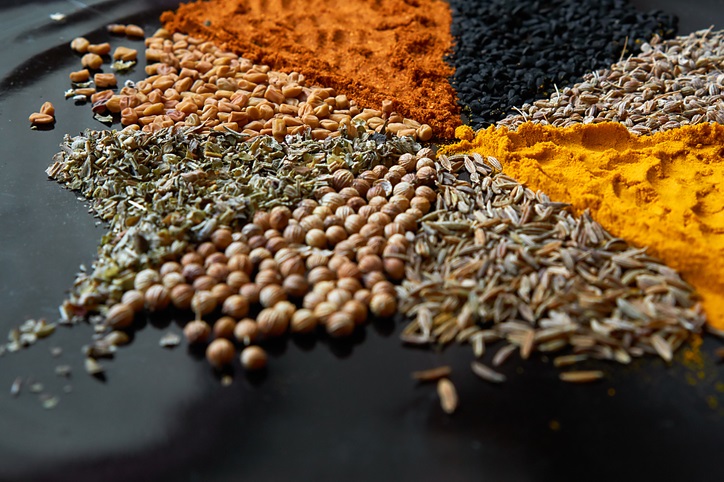How Ayurvedic Foods Can Improve Health and Longevity in Seniors

Ayurveda is a holistic system of medicine which has been used for over a thousand years to promote health and wellness among communities in Asia. Ayurveda predates Western medicine and has helped to treat ailments since long before prescription medicine came into play. Considered one of the oldest traditional systems of medicine known to man, Ayurveda originates in India with a foundation in Hindu philosophy. Asian cultures have been practicing Ayurveda since the 2nd century B.C., with focus on whole-body healing and balance.
While it is no replacement for prescription medicine or Western medical treatments, it can be a way to balance your health in a more holistic manner. If you’re looking to support longevity without adding more medications, try some of these tried and true foods that have long lasting health benefits.
Principles of Ayurvedic Eating
Food and plants are their own medicine, and finding harmony with what you ingest can dramatically change how your body feels. Good and balanced nutrition will not only slow the ageing process but can also add energy and vitality to your everyday lifestyle. What are some foods that can help you to find this balance within your own body?
Ayurvedic Foods That Can Help Senior Health
For seniors, it is recommended to follow a diet low in saturated fats. Animal proteins and simple carbohydrates are helpful, while processed and oily, fried foods tend to exacerbate underlying health conditions. There are a number of foods you can add to your diet that will bring about positive change. Every body is different, with different needs, so it’s best to test these out for yourself and go with what feels right for you.
One thing worth mentioning is that each of the foods listed below are high in antioxidants. Following a diet that is high in antioxidants is known to lower the risk of chronic conditions like diabetes, cancer, obesity and heart disease. Let’s take a look at a few Ayurvedic staples can be eaten or added to your cooking.
Indian Gooseberry
Indian gooseberries, also called amla, have numerous health benefits and are not only antibacterial but also anti-inflammatory. This superfruit is high in antioxidants and vitamins, containing vitamins A, C, E, as well as calcium and iron.
A 100-gram serving contains as much vitamin C as 20 oranges. This superfruit has been used in remedies for over a 1,000 years and the flavonols within are linked to many health benefits including improved memory function. Other compounds include polyphenols, alkaloids and flavonoids. These berries have high levels of vitamin A, a key element in eye health. Not only can they improve vision but they also lower the risk of age-related macular degeneration.
Do you worry about sugar consumption? Amla can help for those with diabetes. The soluble fiber of the berry dissolves quickly, reducing blood sugar spikes. The berries have a positive impact on both blood glucose and lipid count for those with type 2 diabetes. Amla is also known to help with irritable bowel syndrome and the vitamin C within aids the body with absorption of other nutrients.
While best consumed in fresh berry form, there are vitamins and supplements available online that offer the same benefits.
Ashwagandha
Ashwagandha is an evergreen shrub that grows in parts of Asia and Africa. Another amazing plant that can be consumed in various forms, ashwaganda is considered an adaptogen and preventative plant medicine. Studies have shown that regular consumption can boost cognitive brain functioning through enhanced focus, memory and concentration.
Ashwagandha is an excellent addition for anyone battling mental health issues. Depression and anxiety can be reduced through usage; and supplements taken are known to reduce the effects of stress on the body through cortisol reduction.
Fennel & Fennel Seeds
Fennel is a green and white plant that looks somewhat like bok choy. With feathery leaves, this plant is a favorite medicinal and culinary herb.
Consuming fennel seeds regularly can be a great addition to any senior diet. Fennel has antioxidant, anti-inflammatory and antibacterial effects, not to mention it helps combat free radicals.
Fennel seeds contain fiber, vitamin C, calcium, iron, magnesium, potassium and manganese. High in magnesium, these are a great sleep aid- magnesium is known to improve the quality and duration of sleep. Diets high in fiber have been linked to a reduction in heart disease, and fennel. One thing to note is fennel seeds can suppress appetite, which is worth considering if you are underweight.
What Else To Try?
The few foods listed above are just the tip of the iceberg, there are many other health-enriching foods you can add to your diet. Here is a list, some of which you may already be eating: fenugreek seeds, sesame seeds, lemons, ghee, dates, almonds, mung beans, and cumin.
Related Posts

Podcast: Era Living’s In-House Director of Capital Projects

Podcast: A Day in the Life at Era Living: Resident Jeanne Luchtel

